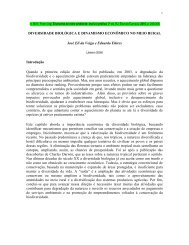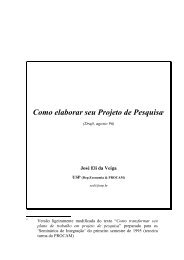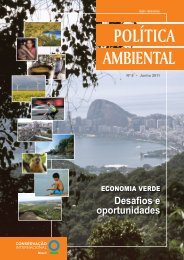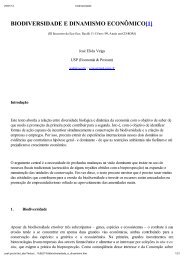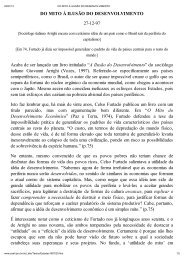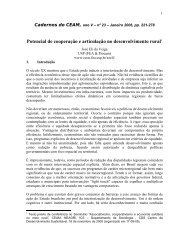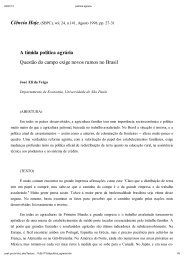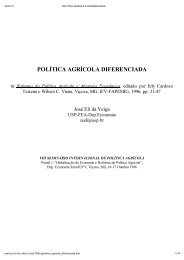sustainable development 20 years on from the ... - José Eli da Veiga
sustainable development 20 years on from the ... - José Eli da Veiga
sustainable development 20 years on from the ... - José Eli da Veiga
You also want an ePaper? Increase the reach of your titles
YUMPU automatically turns print PDFs into web optimized ePapers that Google loves.
243<br />
As part of <strong>the</strong> preparatory process for Rio+<str<strong>on</strong>g>20</str<strong>on</strong>g>, <strong>the</strong> idea of establishing a new set of goals <strong>on</strong><br />
<str<strong>on</strong>g>sustainable</str<strong>on</strong>g> <str<strong>on</strong>g>development</str<strong>on</strong>g> was put forward by Colombia, Guatemala and Peru. Their proposal was to establish<br />
<str<strong>on</strong>g>sustainable</str<strong>on</strong>g> <str<strong>on</strong>g>development</str<strong>on</strong>g> objectives that would serve as a c<strong>on</strong>crete reference for achieving <strong>the</strong> c<strong>on</strong>vergence of<br />
and linkages between <strong>the</strong> three pillars of <str<strong>on</strong>g>sustainable</str<strong>on</strong>g> <str<strong>on</strong>g>development</str<strong>on</strong>g>. Similar to <strong>the</strong> Millennium Development<br />
Goals, <strong>the</strong> <str<strong>on</strong>g>sustainable</str<strong>on</strong>g> <str<strong>on</strong>g>development</str<strong>on</strong>g> goals would be defined at <strong>the</strong> internati<strong>on</strong>al level and would serve to<br />
compare outcomes and identify opportunities for cooperati<strong>on</strong>, including South-South cooperati<strong>on</strong>. 5 As was <strong>the</strong><br />
case for <strong>the</strong> Millennium Development Goals, <strong>the</strong> objectives identified to determine compliance with <strong>the</strong><br />
<str<strong>on</strong>g>sustainable</str<strong>on</strong>g> <str<strong>on</strong>g>development</str<strong>on</strong>g> goals would have to be measurable. While sectoral objectives (such as water, energy,<br />
food, housing and poverty, am<strong>on</strong>g o<strong>the</strong>rs) could be more comm<strong>on</strong>, <strong>the</strong>y could also be transversal, such as<br />
improving nati<strong>on</strong>al accounts, eliminating counterproductive subsidies, promoting innovati<strong>on</strong> and introducing<br />
legislati<strong>on</strong> to improve access to informati<strong>on</strong>, participati<strong>on</strong> and justice in relati<strong>on</strong> to envir<strong>on</strong>mental matters.<br />
Issues such as gender equality and empowerment of women should be covered <strong>on</strong> two counts: as sectoral<br />
matters (in <strong>the</strong>ir own right) and as cross-cutting c<strong>on</strong>cerns (necessary for <strong>the</strong> achievement of all o<strong>the</strong>r goals).<br />
Guideline 5<br />
Produce and disseminate statistics and informati<strong>on</strong> <strong>on</strong> <strong>the</strong> envir<strong>on</strong>ment<br />
and <str<strong>on</strong>g>sustainable</str<strong>on</strong>g> <str<strong>on</strong>g>development</str<strong>on</strong>g><br />
It is difficult for ec<strong>on</strong>omic decisi<strong>on</strong>s and public policies to support <str<strong>on</strong>g>sustainable</str<strong>on</strong>g> <str<strong>on</strong>g>development</str<strong>on</strong>g> and for civil<br />
society to adopt an informed positi<strong>on</strong> in <strong>the</strong> decisi<strong>on</strong>-making process if <strong>the</strong> market sends no informati<strong>on</strong><br />
or signals with respect to <strong>the</strong> envir<strong>on</strong>mental and social costs of <strong>the</strong>se decisi<strong>on</strong>s and policies. Market<br />
silence also encourages a preference for short-term soluti<strong>on</strong>s that disregard future costs or <strong>the</strong> costs for<br />
those without power to influence <strong>the</strong> decisi<strong>on</strong>s.<br />
Decisi<strong>on</strong>-makers must have <strong>the</strong> tools and informati<strong>on</strong> <strong>the</strong>y need to compare alternative courses of<br />
acti<strong>on</strong> and m<strong>on</strong>itor outcomes. The judicial system must have informati<strong>on</strong> <strong>on</strong> true envir<strong>on</strong>mental costs in<br />
order to enforce justice in a proporti<strong>on</strong>al manner. Social stakeholders also need informati<strong>on</strong> in order to<br />
lobby for better public policies and make informed choices.<br />
The following acti<strong>on</strong>s are suggested in this c<strong>on</strong>necti<strong>on</strong>:<br />
(a)<br />
Streng<strong>the</strong>n envir<strong>on</strong>mental informati<strong>on</strong> systems<br />
Envir<strong>on</strong>mental informati<strong>on</strong> systems generate, systematize and make available statistics and<br />
indicators that are indispensable to decisi<strong>on</strong>-makers and <strong>the</strong> general public for analysing and m<strong>on</strong>itoring<br />
public policies. While electr<strong>on</strong>ic platforms enable users to access <strong>the</strong>se <strong>da</strong>ta <strong>from</strong> a single point of access,<br />
<strong>the</strong>ir value obviously depends <strong>on</strong> <strong>the</strong> quality of <strong>the</strong> informati<strong>on</strong> <strong>the</strong>y provide (see point (b)).<br />
Although most countries in <strong>the</strong> regi<strong>on</strong> already have envir<strong>on</strong>mental informati<strong>on</strong> systems, <strong>the</strong>y vary<br />
in terms of coverage and quality. Building up those systems will require str<strong>on</strong>ger nati<strong>on</strong>al and regi<strong>on</strong>al<br />
systems for compiling, m<strong>on</strong>itoring and analysing <strong>da</strong>ta related to <strong>the</strong> envir<strong>on</strong>ment, with a view to<br />
guaranteeing <strong>the</strong> availability of structured and comparable official informati<strong>on</strong>, using <strong>the</strong> internati<strong>on</strong>al<br />
recommen<strong>da</strong>ti<strong>on</strong>s <strong>on</strong> envir<strong>on</strong>mental statistics adopted by <strong>the</strong> United Nati<strong>on</strong>s Statistical Commissi<strong>on</strong> as a<br />
c<strong>on</strong>ceptual and methodological framework.<br />
5<br />
See <strong>the</strong> initial proposal presented at <strong>the</strong> Latin American and Caribbean Regi<strong>on</strong>al Meeting Preparatory to <strong>the</strong><br />
United Nati<strong>on</strong>s C<strong>on</strong>ference <strong>on</strong> Sustainable Development, held in Santiago, Chile, in September <str<strong>on</strong>g>20</str<strong>on</strong>g>11 (ECLAC,<br />
<str<strong>on</strong>g>20</str<strong>on</strong>g>11) and Colombia’s input to <strong>the</strong> Rio+<str<strong>on</strong>g>20</str<strong>on</strong>g> compilati<strong>on</strong> document sent to <strong>the</strong> C<strong>on</strong>ference Secretariat in October<br />
<str<strong>on</strong>g>20</str<strong>on</strong>g>11 [<strong>on</strong>line] www.uncsd<str<strong>on</strong>g>20</str<strong>on</strong>g>12.org/rio<str<strong>on</strong>g>20</str<strong>on</strong>g>/index.php?menu=115.



